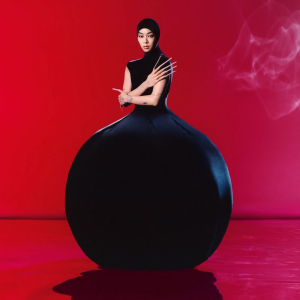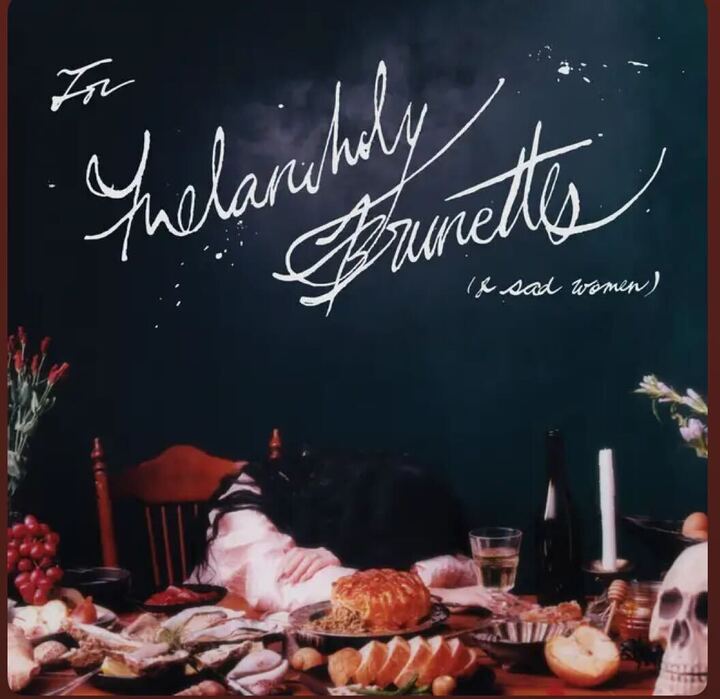Grab your tissues and dancing shoes, everyone – Rina Sawayama’s new album “Hold the Girl” is finally here.
Sawayama opens up her recent album with the song “Minor Feelings’’ with heavy and haunting lyrics. This track pays tribute to her Asian roots and addresses microaggressions directed at Asians during the peak of the pandemic. The track begins with a serene instrumental, like a couple of tracks later on in the album, with Sawayama coming in and beginning to paint a story with the lyrics. She references plastic shields that were used to ward people and germs away during the pandemic and tells about building pillow and blanket forts between her couch and windowsill with a want to protect herself from the outside world. This mix of parallels then turns into a confessional where Sawayama is staking her claim on her identity as a person of Asian descent, and how all of the microaggressions are starting to pile up into something larger.
The next track is the title track of the album, “Hold the Girl”. This song does a complete 180 from the first track and is one of the first few upbeat songs on the album. The song starts with Sawayama singing over a piano instrumental then quickly picks up into a poppy, almost Discoteca beat. The lyrics tell a story of a younger Sawayama and how she acted out and suddenly hits an epiphany as she reflects on how she left her inner child alone to search for a way to ease her pain while growing up. The genre-clashing of the lyrics and instrumental makes this track a stand-out track on the album and deserves to share a name with the entirety of the album.
“This Hell” is the third track on the album and opens with a country-pop guitar riff that gives this song a two-step beat with a catchy chorus. This song references her “chosen family”, to whom she has dedicated this song. Sawayama is a member of the LGBTQ community and refers back to her song “Chosen Family” with this track as she has shone a light on the way that when some people come out they are ostracized by their families and friends just because they don’t identify as straight. This track also references Briney Spears, Lady Diana and Whitney Houston when talking about how the paparazzi are notorious for following the women named around. This is Sawayama’s way of saying she doesn’t mind if they catch her “getting down and dirty”.
The fourth track, “Catch Me In The Air” tells a story from two perspectives. Sawayama has stated on Instagram that the first verse of the track is from the perspective of a parent looking out for their child, and the second verse is from the perspective of a child who feels trapped in their own home. Sawayama came from a single-parent household and uses this verse to tell the story of her and her mother growing up and how strenuous their relationship was, and how it was only intensified with their different cultural backgrounds. This track talks about how they were still there to catch each other in difficult times and were able to move past their differences. This track has very heavy lyrics and is lightened with poppy guitar riffs and drum beats that make the song easier for listeners.
The fifth track is a balladesque song titled “Forgiveness”. This track is about realizing that to move forward in life we need to face our past experiences head-on and need to forgive the people in our lives to move on. Featuring Sawayama’s strong vocals with a dramatic instrumental that paints a vivid story. The strong guitar chords and strong drum beat help the track stand out as a more emotionally charged song that is a staple in Sawayama’s discography.
The sixth track, “Holy (Til You Let Me Go)” is a flawless continuation of the ending instrumental of the previous track. The song starts with the sound of church bells ringing that represent the time she spent at a religious school and the end of the song there is a snippet of a conversation between Lauren Aquilina and a close friend of Sawayma’s. The lyrics describe the traumatic experiences Sawayama faced as a student at Magdalene College. The lyrics serve as a confessional for Sawayama, combined with a moody beat that incorporates a dark-pop beat to build up to a calmer chorus.
The usage of a dark-pop beat is continued into the next track, “Your Age”. The song starts with a banjo riff to reintroduce the western-style theme of the album, but it is a lot angrier than the rest of the album. This song was the last song to be written for the album and almost sounds like a close-out to the album. Sawayama has said this song holds a lot of angry emotions and just disbelief at the behaviors that were allowed by the adults in her youth in the 90s.
“Imagining” is the eighth track of the album and has a mix of UK pop beats and early US pop-punk-styled guitar riffs. The beat is very poppy and very much club-worthy, but the message of the song is something opposite. The lyrics depict an instance of gaslighting and a spiral after finding out a version of the truth that believed wasn’t true at all. The lowered vocals are borderline drowned out by the bump of the instrumental throughout the song which follows the confusion in the lyrics
The ninth track, “Frankenstein” starts with an indie bass and drum line. Sawayama draws inspiration from the song “Love Is A Number” by White Rose movement for the instrumental of this track. This track continues the fast-paced beat of the previous track but with a unique drum track that highlights and softens the lyrics of Sawayama begging some to therapize her into putting her back together again. This song is another stand-out track on the album and adds something similar for older Sawayama listeners to love.
“Hurricanes” is the tenth song of this album. This track is a drum-driving song that is adjacent to early 2000s Kelly Clarkson and Avril Lavigne as the lyrics tell a story of self-sabotage but finding contentment in where you ended up. In the second verse of this song, Sawayama talks about wanting to be the best at everything, even if she is not the best version of herself, and talks about how she needs help now because she is burnt out under the immense amount of pressure she has put herself under. This track really shows the versatility in Sawayama’s music as this song is the most unique sounding on the album.
“Send My Love To John” is an acoustic ballad and acts as a pause after the intensity of the songs before it. Sawayama has said this track is an apology from a mother to her queer child for not accepting him as who he is because of her religious background. The title of the track is from a real experience of one of Sawayama’s friends, where his mother ended a phone call with “send my love to John” (her friend’s long-time boyfriend). This acts as an apology to the people that need it, but may never hear it from their loved ones.
The second to last track is “Phantom” and continues the message of healing your inner child to find peace in your adult life. This song calls back to the title track “Hold the Girl” in which Sawayama wants to embrace her inner child with the lyrics like “inner child, come back to me”. This song is very profound in sound and acts as another stand-out track with strong electric guitar solos and a story of reconciliation and forgiveness in the lyrics.
The last track, “To Be Alive” is another unique-sounding track on the album. The song’s instrumental is light compared to the rest of the album and acts as a complete 180 to the beginning track “Minor Feelings”.This whole album is Sawayama addressing the events of her early life and the journey of healing she went through, and this song is the result of finally finding some peace in her life for the first time in a long time. This track was the light resolution the album needed to complete the story of finding oneself while going through their healing journey.






